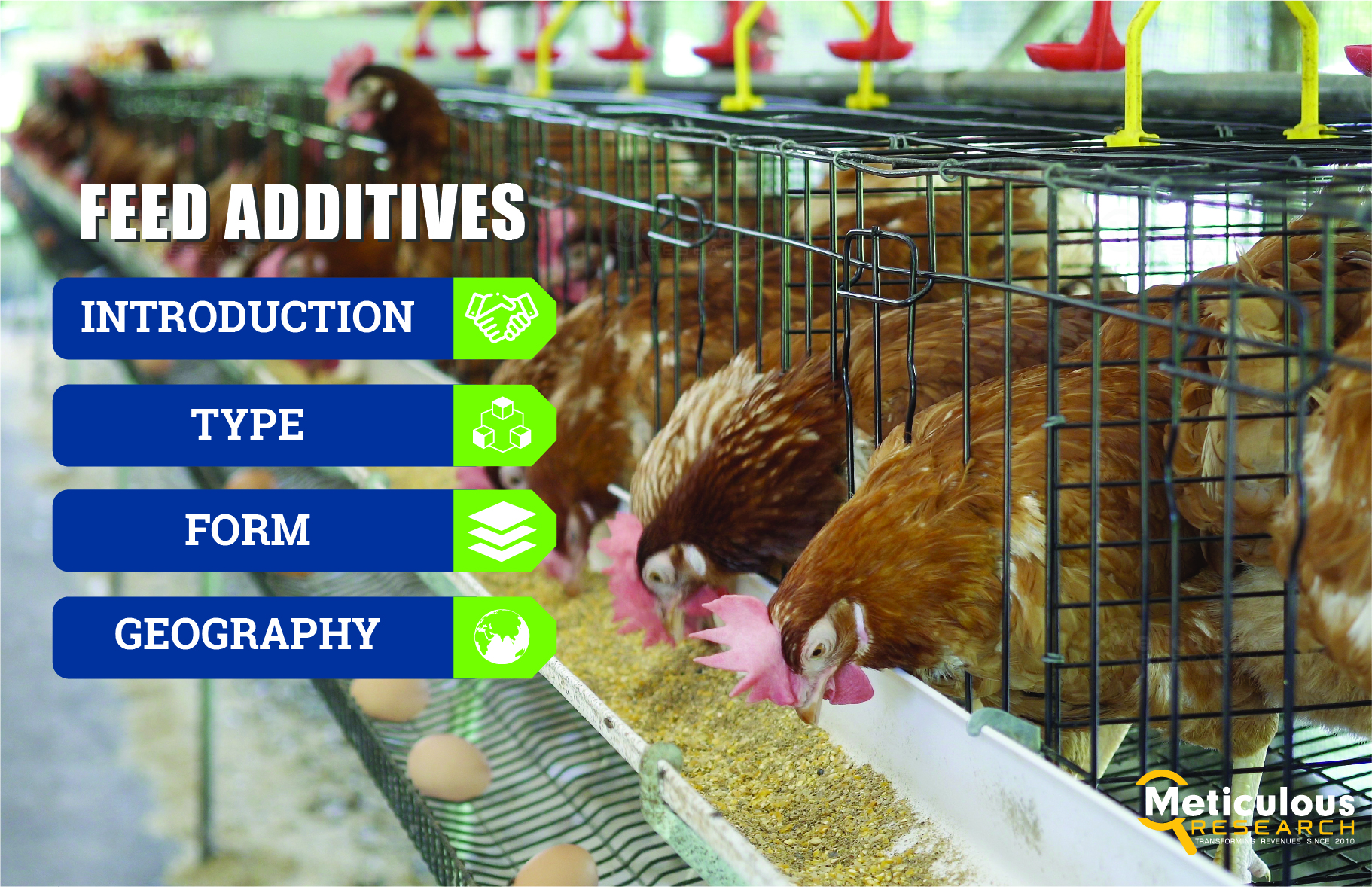
The feed additives market is anticipated to reach $51.2 billion by 2030, growing at a compound annual growth rate (CAGR) of 5.3% during the forecast period from 2023 to 2030.
The compound feed sector’s expansion is a key driver for the global feed additives market. Compound feed refers to a balanced mixture of raw materials sourced from plants or animals, which is orally administered to livestock for optimal nutrition. In recent years, the popularity of compound feed has surged due to its convenience, cost-effectiveness, and ability to provide animals with essential nutrients. Feed additives play a critical role in enhancing the nutritional value of compound feed, addressing nutrient deficiencies, improving taste and digestibility, promoting nutrient absorption, and stabilizing the gut microflora, all of which contribute to animal health and productivity.
Feed additives are essential components of compound feed, as they significantly enhance the overall quality and effectiveness of the feed. For instance, enzymes are commonly added to animal feed to aid in the digestion of complex carbohydrates and proteins. Similarly, amino acids are introduced to boost the protein content of the feed, which is vital for muscle development and overall growth in livestock. By enriching compound feeds with these additives, farmers can ensure that their animals receive a balanced diet, leading to improved health, enhanced growth rates, and increased productivity.
Download Sample Report Here: https://www.meticulousresearch.com/download-sample-report/cp_id=5082
Rising Demand for Compound Feed
The global demand for compound feed has witnessed substantial growth over the years. According to the Alltech Global Feed Survey 2023, the production of compound feed reached 1,266.4 million tons globally in 2022, representing a 6.6% increase over 2020. This surge in demand for compound feed has, in turn, fueled the need for feed additives. With more livestock being raised for meat, dairy, and other agricultural products, there is a growing emphasis on providing high-quality nutrition to animals to improve their health and performance.
One of the key benefits of compound feed fortified with additives is its ability to promote overall well-being in animals. Additives such as probiotics help in stabilizing the gut microflora, ensuring better digestion and absorption of nutrients. Additionally, vitamins and minerals are often added to compound feed to support immune function, bone health, and metabolic processes in livestock. This ensures that animals not only grow faster but also remain healthier throughout their lifecycle, reducing the need for antibiotics and other medical interventions.
Impact of Feed Additives on Animal Productivity
Feed additives have a direct impact on the productivity of livestock. By improving the digestibility and nutrient absorption of compound feed, these additives enable animals to convert feed into energy more efficiently. This leads to better growth rates, higher milk production, and improved egg yields in poultry. Moreover, feed additives such as antioxidants help in preserving the nutritional quality of the feed, ensuring that animals receive fresh and potent nutrients even after prolonged storage.
Enzymes are particularly important in enhancing the digestibility of feed components. For example, phytase is an enzyme that breaks down phytate, a form of phosphorus that is typically indigestible by animals. By adding phytase to compound feed, livestock can absorb more phosphorus, which is essential for bone development and overall growth. This not only improves the health of the animals but also reduces the environmental impact of livestock farming by minimizing the excretion of undigested nutrients.
Check complete table of contents with list of tables and figures: https://www.meticulousresearch.com/product/feed-additives-market-5082
Expanding Production and Market Reach of Feed Additives
To meet the growing demand for feed additives, leading manufacturers are expanding their production capacities and market reach. In March 2023, Evonik Industries AG (Germany) increased its MetAMINO (DL-methionine) production capacity in Singapore by 40,000 metric tons, raising its annual production to 340,000 metric tons. Methionine is a vital amino acid used in livestock feed to promote healthy growth and improve feed efficiency. By expanding its production capacity, Evonik aims to meet the rising demand for methionine in the animal nutrition sector.
Similarly, Nutreco N.V. (Netherlands) has entered into a long-term research and commercial partnership with BiomEdit (U.S.) to develop novel feed additives through microbiome technology. This collaboration aims to explore innovative ways to enhance animal health and nutrition by leveraging the power of the microbiome. Such partnerships are expected to drive further advancements in feed additive technology, providing new solutions to improve livestock productivity and health.
In January 2022, Archer-Daniels-Midland Company (U.S.) established an aquaculture innovation lab at its animal nutrition technology center in the U.S. This facility is dedicated to developing novel nutrition solutions for the aquaculture industry, which is a growing sector within animal agriculture. The lab’s focus on innovation underscores the importance of research and development in driving the future growth of the feed additives market.
Government Support and Regulations
Governments around the world are recognizing the importance of feed additives in promoting sustainable livestock farming. Regulatory bodies are implementing policies to ensure the safe use of feed additives and to encourage their adoption in animal agriculture. For instance, the European Union has stringent regulations governing the use of antibiotics in livestock feed, which has led to increased demand for alternative additives such as probiotics and enzymes.
In the U.S., the Food and Drug Administration (FDA) closely monitors the use of feed additives to ensure their safety and efficacy. The FDA’s approval process for feed additives includes rigorous testing to determine their impact on animal health and productivity. This regulatory framework has created a favorable environment for the growth of the feed additives market, as manufacturers are required to adhere to high standards of quality and safety.
Challenges and Opportunities in the Feed Additives Market
Despite the positive outlook, the feed additives market faces several challenges. One of the main challenges is the rising cost of raw materials used in the production of feed additives. This has led to an increase in the overall cost of compound feed, which may discourage some farmers from adopting fortified feeds. Additionally, there is growing concern over the environmental impact of livestock farming, particularly with regard to greenhouse gas emissions and land use.
However, these challenges also present opportunities for innovation in the feed additives market. For instance, there is increasing interest in developing feed additives that can reduce methane emissions from livestock. Methane is a potent greenhouse gas, and livestock are one of the largest sources of methane emissions. By developing feed additives that can reduce methane production in the digestive systems of ruminants, manufacturers can help farmers reduce their environmental footprint while improving animal productivity.
Another area of opportunity is the development of plant-based feed additives. As consumer demand for plant-based products continues to grow, there is a corresponding interest in plant-based feed additives that can provide the same nutritional benefits as traditional additives. This shift towards sustainable and plant-based solutions is expected to drive further innovation in the feed additives market.
Quick Buy: https://www.meticulousresearch.com/Checkout/99881918
Scope of the Report:
Feed Additives Market Assessment, by Type
- Performance Additives
- Amino Acids
- Lysine
- Methionine
- Threonine
- Other Amino Acids
- Minerals
- Macro Minerals
- Trace Minerals
- Vitamins
- Fat-Soluble Vitamins
- Vitamin A
- Vitamin E
- Vitamin D
- Vitamin K
- Water-Soluble Vitamins
- Vitamin C
- Vitamin B Complex
- Fat-Soluble Vitamins
- Amino Acids
- Specialty Additives
- Acidifiers
- Probiotics
- Lactobacillus
- Bifidobacterium
- Yeast and Other Microbes
- Enzymes
- Phytase
- Carbohydrase
- Protease
- Antioxidants
- Ethoxyquin
- BHT
- BHA
- Other Antioxidants
- Antibiotics
- Other Types
Feed Additives Market Assessment, by Animal Type
- Poultry
- Broilers
- Layers
- Turkey
- Other Poultry Birds
- Ruminants
- Beef Ruminants
- Dairy Ruminants
- Swine
- Aquatic Animals
- Other Animals
Feed Additives Market Assessment, by Source
- Synthetic Feed Additives
- Natural Feed Additives
Feed Additives Market Assessment, by Form
- Dry Feed Additives
- Liquid Feed Additives
Feed Additives Market Assessment, by Geography
- Asia-Pacific
- China
- India
- Japan
- Australia
- Rest of Asia-Pacific
- Europe
- Spain
- Russia
- Germany
- France
- Italy
- U.K.
- Netherlands
- Poland
- Rest of Europe
- North America
- U.S.
- Canada
- Latin America
- Brazil
- Mexico
- Argentina
- Rest of Latin America
- Middle East & Africa
About Meticulous Research®
Meticulous Research® is a leading provider of comprehensive market intelligence, offering actionable insights and analysis across various industries. Our reports empower businesses to make informed decisions, drive growth, and remain competitive in a rapidly evolving marketplace.
Contact Us:
Meticulous Market Research Pvt. Ltd.
1267 Willis St, Ste 200 Redding,
California, 96001, U.S.
USA: +1-646-781-8004
Europe : +44-203-868-8738
APAC: +91 744-7780008
Email- sales@meticulousresearch.com
Visit Our Website: https://www.meticulousresearch.com/
Connect with us on LinkedIn- https://www.linkedin.com/company/meticulous-research







